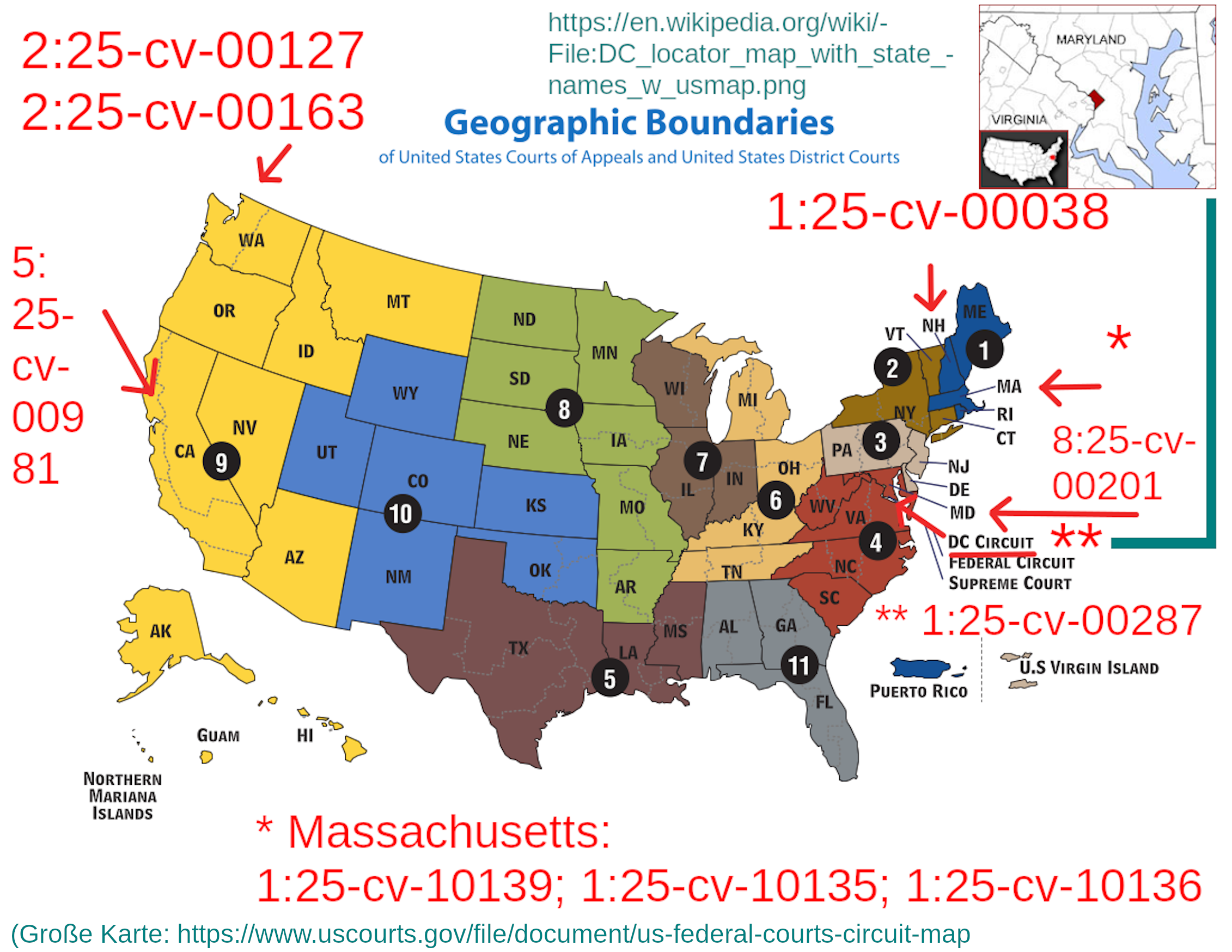In Gerichtsverfahren wegen des Streits um die Neubestimmung der US-Staatsangehörigkeit durch Präsident Trump waren für Freitag mehrere neue Regierungs-Schriftsätze zu erwarten. Einige wurde vor, zwei wurden nach Mitternacht MEZ veröffentlicht.
I.
Casa Inc. v. Trump (8:25-cv-00201) vor dem District Court Maryland
1. Der erste gestern abend veröffentlichte Schriftsatz war der für das Verfahren in Maryland:
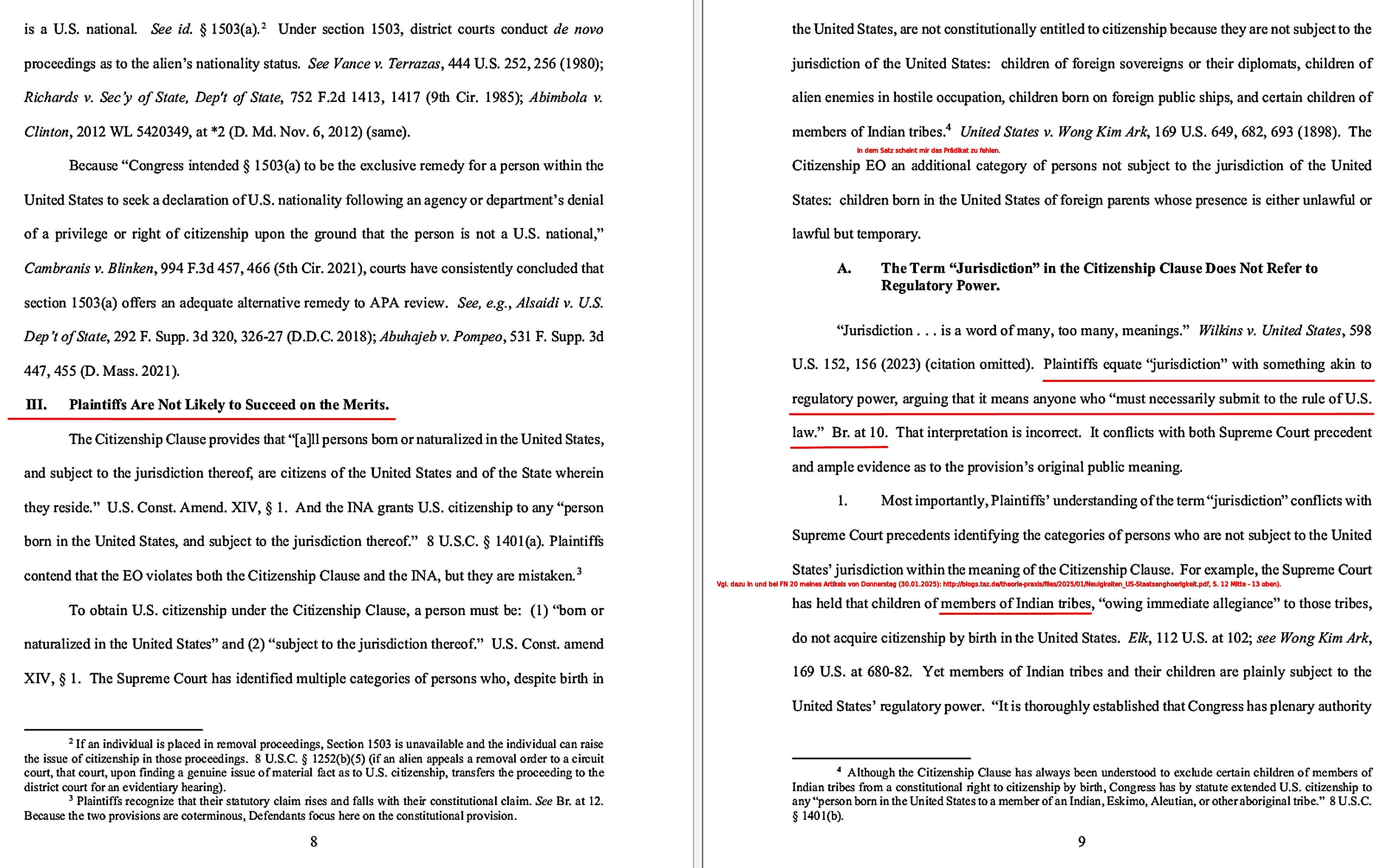
https://storage.courtlistener.com/recap/gov.uscourts.mdd.574698/gov.uscourts.mdd.574698.40.0.pdf
2. In dem Schriftsatz geht es auf den Seiten S. 8 unten der gedruckten (bzw. 10 unten der digitalen) Seitenzählung bis S. 26 Mitte (bzw. 28 Mitte) um die Erfolgsaussichten in der Hauptsache (im Moment geht es erst einmal um Eilrechtsschutz [für den u.a. die Erfolgsaussichten in der Hauptsache eine Rolle spielen]) für die Plaintiffs, die die Verfassungsgemäßheit von Trumps Executive Order in dieser Angelegenheit vom 20.01.2025 bestreiten.
3. Der heutige Regierungsschriftsatz antwortet auf diesen:
https://storage.courtlistener.com/recap/gov.uscourts.mdd.574698/gov.uscourts.mdd.574698.2.1_1.pdf
Schriftsatz der Plaintiffs im dortigen Verfahren, zwei NGO (CASA, Inc. und Asylum Seeker Advocacy Project) sowie mehrere – ausschließlich mit Vornamen bezeichnete – Schwangere (https://storage.courtlistener.com/recap/gov.uscourts.mdd.574698/gov.uscourts.mdd.574698.1.0_1.pdf, S. 8 – 18), vom 21.01.2025. In deren Schriftsatz ging es auf den S. 5 der gedruckten (bzw. 7 der digitalen) Seitenzählung bis S. 13 (bzw. 15) um die Erfolgsaussichten in der Hauptsache.
4. Hauptstreitpunkt in allen Verfahren ist – wie am Donnerstag bereits erklärt (S. 2 [Nr. 4]) – die Auslegung der Formulierung „subject to the jurisdiction thereof“ im 14. Zusatz zur US-Verfassung.
5.a) Der zweiten Satz von Abschnitt III. A. des heutigen Regierungs-Schriftsatzes lautet:
„Plaintiffs equate ‚jurisdiction‘ with something akin to regulatory power, arguing that it means anyone who ‚must necessarily submit to the rule of U.S. law.‘ Br. at 10. T“
b) Dies bezieht sich auf folgende Stelle
„The Wong Kim Ark Court […] held that ‚[e]very citizen or subject of another country, while domiciled here, is within the allegiance and the protection, and consequently subject to the jurisdiction, of the United States.‘ Id.; see also James C. Ho, Defining “American,” 9 Green Bag 2d 359, 360 (2006) (‚To be ‘subject to the jurisdiction’ of the U.S. is simply to be subject to the authority of the U.S. government,‘ and ‚[t]he phrase thus covers the vast majority of persons within our borders who are required to obey U.S. laws,‘ which, ‚of course, does not turn on immigration status, national allegiance, or past compliance.‘);“
im Plaintiffs-Schriftsatz vom 21.01.2025 (dort S. 10 gedruckten bzw. 12 der digitalen Seitenzählung).
-
„Wong Kim Ark Court“ = Der US-Supreme Court in der Zusammensetzung, die er bei der Entscheidung United States v. Wong Kim Ark, 169 U.S. 649 von 1898 hatte.
-
Diese Entscheidung und der genannte Aufsatz von James C. Ho sowie jedenfalls zumindest ein Teil der im hier interessierenden Abschnitt des heutigen Regierungs-Schriftsatzes genannten Fundstellen sind bereits in meinem gestrigen Artikel verlinkt. –
6. Den AnwältInnen der Plaintiffs wird Wochenendarbeit bevorstehen, denn bereits am Mittwoch (05.02.2025) wird in dem Verfahren eine mündlich Verhandlung, zu der es vielleicht einen audio stream geben wird (https://storage.courtlistener.com/recap/gov.uscourts.mdd.574698/gov.uscourts.mdd.574698.36.0_1.pdf), stattfinden; eine schriftliche Antwort auf den heutigen Regierungs-Schriftsatz wird vorher fertig werden müssen.
II.
State of New Jersey v. Trump (1:25-cv-10139) sowie Doe v. Trump (1:25-cv-10135) vor dem District Court Massachusetts
1. a) Goverment’s Opposition re Motion for Preliminary Injunction
https://storage.courtlistener.com/recap/gov.uscourts.mad.279895/gov.uscourts.mad.279895.92.0.pdf = https://storage.courtlistener.com/recap/gov.uscourts.mad.279876/gov.uscourts.mad.279876.22.0.pdf, jeweils Abschnitt „Plaintiffs Are Not Likely To Succeed On the Merits“, S. 14 bzw. 25 bis S. 35 bzw. 46.
„Plaintiffs equate ‚jurisdiction‘ with something akin to regulatory power, arguing that anyone ‚to whom United States law applies‘ is subject to the jurisdiction of the United States. Doe Mem. at 7; see also New Jersey Mem. at 9-10.“
(S. 15 bzw. 26)
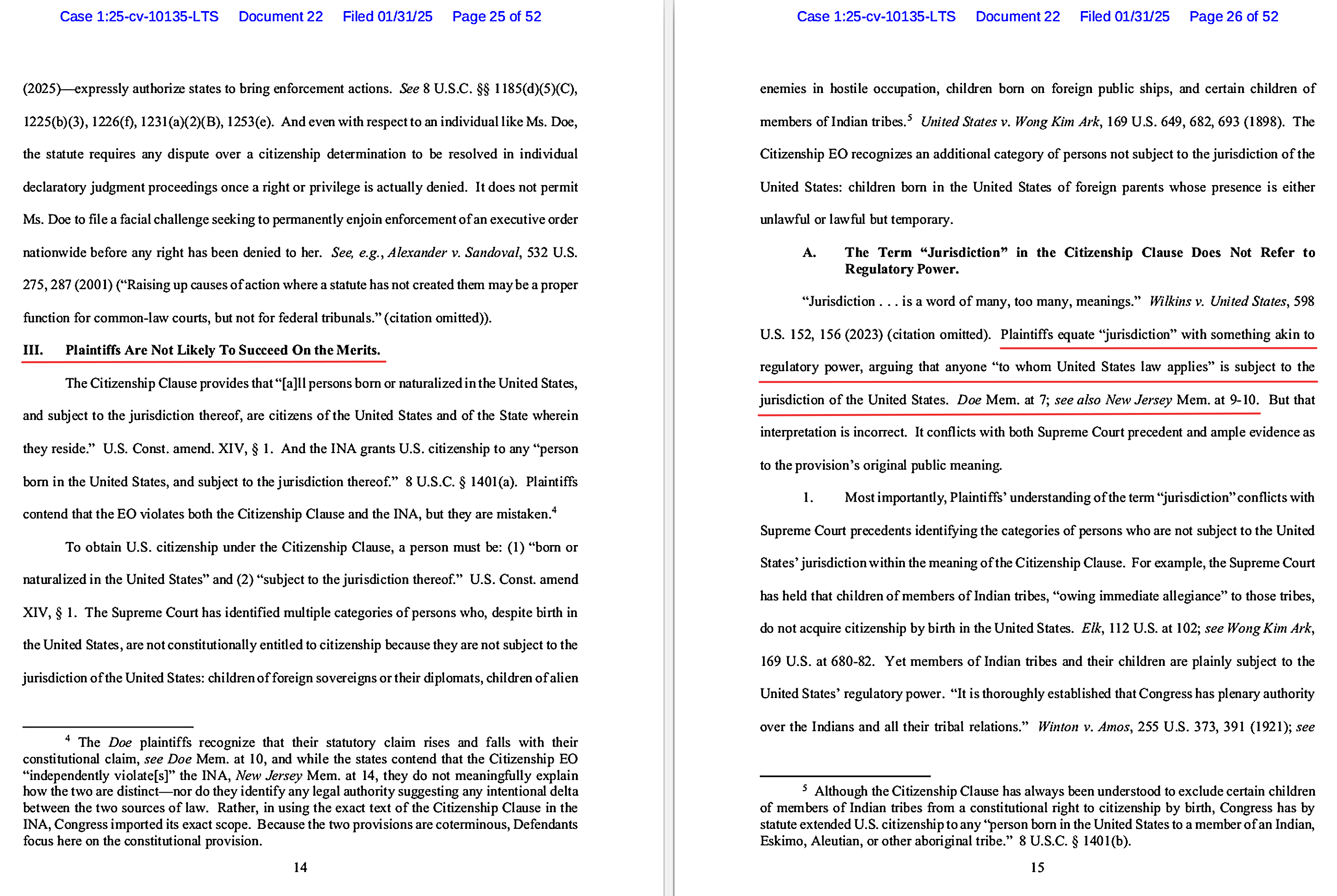
b) Die Schriftsätze, auf die die Regierung antwortet:
aa) im Verfahren State of New Jersey v. Trump
https://storage.courtlistener.com/recap/gov.uscourts.mad.279895/gov.uscourts.mad.279895.5.0_2.pdf, Abschnitt „Plaintiffs Are Highly Likely to Succeed on The Merits“, S. 9 bzw. 15 bis S. 14 bzw. 20
„The sole textual question is thus whether a child born in the United States to non-citizen parents is ’subject to the jurisdiction‘ of the United States. That question admits of an easy answer: prior to the adoption of the Citizenship Clause in 1868, it was established that persons physically present in the United States, including non-citizens and their children, were subject to its sovereign power and control. See, e.g., Noah Webster, An American Dictionary of the English Language 635 (George & Charles Merriam 1860) (Ex. X) (explaining legal term of art ’subject to the jurisdiction‘ refers to the sovereign’s ‚[p]ower of governing or legislating‘ or ‚power or right of exercising authority‘ over the person); Schooner Exchange v. McFaddon, 11 U.S. 116, 136 (1812) (Marshall, C.J.) (‚The jurisdiction of the nation within its own territory is necessarily exclusive and absolute. It is susceptible of no limitation not imposed by itself.‘); Wong Kim Ark, 169 U.S. at 693 (emphasizing ‚[i]t can hardly be denied that an alien is completely subject to the political jurisdiction of the country in which he resides‘).“
(S. 9 f. bzw. 15 f.)
bb) im Verfahren Doe v. Trump
https://storage.courtlistener.com/recap/gov.uscourts.mad.279876/gov.uscourts.mad.279876.11.0_1.pdf, Abschnitt „Plaintiffs Are Likely to Succeed On The Merits“, S. 6 bzw. 11 bis S. 11 bzw. 16
„Thus, under the Citizenship Clause, the citizenship of those born in the United States is limited only by the qualifying language ’subject to the jurisdiction thereof.‘ U.S. Const. amend. XIV, § 1. That meaning is easily ascertained by reference to history, ordinary usage, and—most importantly—long-settled Supreme Court precedent. All three support that the word ‚jurisdiction‘ refers to the United States’ sovereign lawmaking authority. With that in mind, ’subject to the jurisdiction thereof‘ refers to anyone to whom United States law applies. Or, put another way, it excludes only those with some kind of recognized immunity from American law.“
(S. 7 bzw. 12)
2. Die Plaintiffs haben bis Dienstag (04.02.2025) Zeit zum Antworten; die mündliche Verhandlung wird am Freitag (07.02.2025) sein.
III.
New Hampshire Indonesian Community Support v. Trump (1:25-cv-00038) vor dem District Court New Hampshire
1. a) Government’s Memorandum of Law in Objection to Plaintiffs‘ Motion for Preliminary Injunc[tion]
https://storage.courtlistener.com/recap/gov.uscourts.nhd.64907/gov.uscourts.nhd.64907.58.1.pdf, Abschnitt II. „Plaintiffs Are Not Likely To Succeed on the Merits“, S. 7 bzw. 17 bis S. 27 bzw. 37
„Plaintiffs equate ‚jurisdiction‘ with something akin to regulatory power, suggesting that Wong Kim Ark held that anyone who was ’subject to the enforcement of United States law‘ is subject to the jurisdiction of the United States. See Mem. at 5; see also id. 5-8.“
(S. 8 bzw. 18)
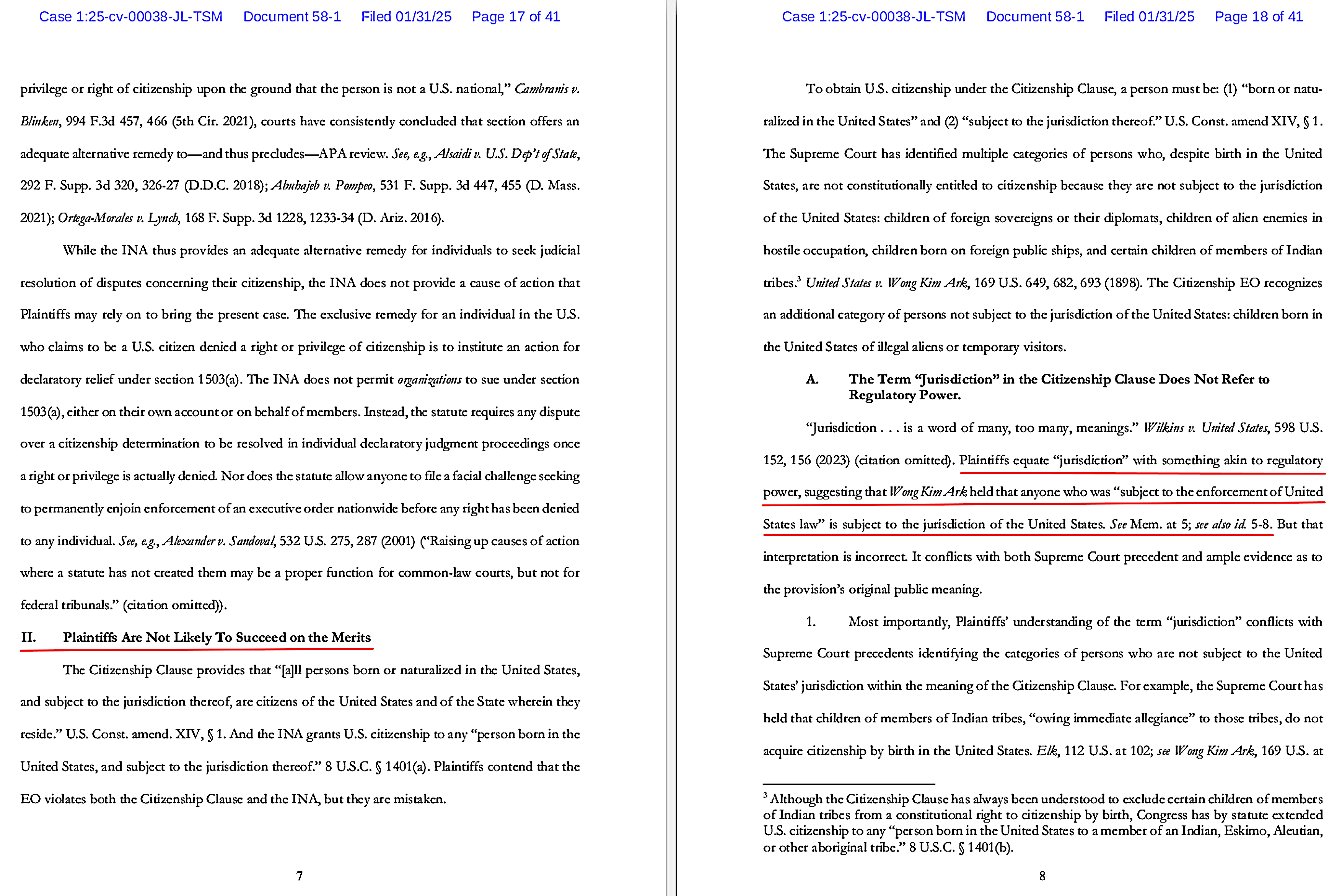
b) Der Schriftsatz, auf den die Regierung antwortet:
https://storage.courtlistener.com/recap/gov.uscourts.nhd.64907/gov.uscourts.nhd.64907.24.1_1.pdf, Abschnitt 1. „The Order Is Unconstitutional and Violates Federal Statute“, S. 3 bzw. 4 bis S. 12 bzw. 13
„The [Supreme] Court explained that the Fourteenth Amendment’s requirement that children born in the United States must be ’subject to the jurisdiction thereof‘ to qualify as citizens was crafted to exclude only children who were not subject to the United States’ jurisdiction because they and their parents were not subject to criminal and civil enforcement under the United States’ laws. 169 U.S. at 693. Wong Kim Ark and his parents were plainly subject to the enforcement of United States law; he, therefore, was a citizen.“
(S. 5 bzw. 6)
„as noted, Wong Kim Ark already interpreted the phrase ’subject to the jurisdiction‘ to include just a few specific, exceptional categories: ‚children of foreign sovereigns or their ministers, or born on foreign public ships, or of enemies within and during a hostile occupation of part of our territory ….‘ 169 U.S. at 693.31 None of those narrow exceptions applies to ordinary people like Plaintiffs and their members—and an examination of them thoroughly refutes Defendants’ position.
For example, children of foreign ministers are beyond the United States’ jurisdiction pursuant to the doctrine of consular immunity, which exempts foreign sovereigns and their ministers from criminal and civil law enforcement. […].“
(S. 6 bzw. 7)
„Likewise, the exception for those children born “of enemies within and during a hostile occupation of part of our territory,” id. at 693, has no application here [here = Kinder von MigrantInnen ohne unbefristetem, legalen Aufenthaltsstatus] […] Wong Kim Ark explained that this exception applies to a situation like that presented in United States v. Rice, which involved a period during the War of 1812 in which, because of British military occupation, “[t]he sovereignty of the United States over the [Maine] territory was . . . suspended, and the laws of the United States could no longer be rightfully enforced there.” 17 U.S. 246, 254 (1819); see Wong Kim Ark, 169 U.S. at 682-83 (discussing Rice). Defendants cannot credibly point to any such occupation today—the United States can apply its laws to all noncitizens, including undocumented noncitizens.“
(S. 7 bzw. 8)
„‚an alien is completely subject to the political jurisdiction‘ of the United States ‚for so long a time as he continues within the dominions‘ of the United States. 169 U.S. at 693-94 (emphasis added). The Supreme Court has subsequently reaffirmed this conclusion, holding in Plyler v. Doe that undocumented noncitizens’ ‚presence within the State’s territorial perimeter‘ gives rise to ‚the full range of obligations imposed by the State’s civil and criminal laws‘ and thus they are ‚within [a State’s] jurisdiction‘ for the purposes of another provision of the Fourteenth Amendment. 457 U.S. 202, 211 n.10 (1982) (relying on Wong Kim Ark). The same is true of Plaintiffs’ members. They are subject to the laws (including the immigration and criminal laws) of the United States, and therefore they and their children are subject to its jurisdiction. As such, their children born on U.S. soil are natural born citizens. See, e.g., INS v. Rios-Pineda, 471 U.S. 444, 446 (1985) (child ‚born in the United States‘ to couple that entered without inspection ‚was a citizen of this country‘); Mariko v. Holder, 632 F.3d 1, 8 n.4 (1st Cir. 2011) (‚Because [the child] was born in the United States, she—unlike her parents [who had entered unlawfully]—is a United States citizen.‘). Because the Order says otherwise, it is unconstitutional.“
(S. 8 bzw. 9)
2. Die Plaintiffs haben bis Freitag (07.02.2025) Zeit zum Antworten; die mündliche Verhandlung wird am Montag (10.02.2025) sein.
IV.
State of Washington v. Trump (2:25-cv-00127) [verbunden mit Franco Aleman v. Trump (2:25-cv-00163)] vor dem District Court für den Western District des Bundesstaates Washington
1. a) Response, by All Defendants, to Motion for Preliminary Injunction and Supplemental Motion for Preliminary Injunction
http://blogs.taz.de/theorie-praxis/files/2025/02/Gov_Rep_Washington_u_Franco_Aleman.pdf, Abschnitt III. „Plaintiffs Are Not Likely To Succeed On the Merits“, S. 17 bzw. 30 bis S. 40 bzw. 53
„Plaintiffs equate ‚jurisdiction‘ with something akin to regulatory power, arguing that the children of illegal aliens or temporary visitors are subject to the jurisdiction of the United States because they ‚must comply with U.S. law.‘ State PI Mot. at 10; see also Class PI Mot. at 12 (asserting that jurisdiction means ’subject to the authority or sovereign power of a country or government‘).“
(S. 18 bzw. 31)

b) Die Schriftsätze, auf die die Regierung antwortet:
aa) Motion for Preliminary Injunction der Bundesstaaten Washington, Oregon, Arizona und Illinois
https://storage.courtlistener.com/recap/gov.uscourts.wawd.343943/gov.uscourts.wawd.343943.63.0_1.pdf, Abschnitt III. B. „The Plaintiff States’ Claims Are Likely to Succeed on the Merits Because Birthright Citizenship Is a Cornerstone of American Constitutional and Statutory Law That Is Beyond Serious Dispute“, S. 9 bzw. 15 bis S. 15 bzw. 21
„The only U.S.-born individuals excluded are those who are not subject to the jurisdiction of United States’ law at birth—the children of diplomats covered by diplomatic immunity and children born to foreign armies at war against the United States on U.S. soil. Not excepted are children born in the United States, even if their parents are undocumented or here lawfully but on a temporary basis. They must comply with U.S. law; so too must their parents. Undocumented immigrants pay taxes, must register for the Selective Service, and must otherwise follow—and are protected by—federal and state law just like anyone else within the United States’ territorial sweep. See Plyler v. Doe, 457 U.S. 202, 211 (1982) (‚That a person’s initial entry into a State, or into the United States, was unlawful … cannot negate the simple fact of his presence within the State’s territorial perimeter. Given such presence, he is subject to the full range of obligations imposed by the State’s civil and criminal laws.‘). Indeed, it is absurd to suggest that undocumented immigrants are somehow not subject to the jurisdiction of the United States. They may be arrested and deported precisely because they are subject to the jurisdiction of the United States.“
(S. 10 bzw. 16)
bb) Supplemental Motion for Preliminary Injunction, filed by Consol Plaintiffs Delmy Franco Aleman, Cherly Norales Castillo, Alicia Chavarria Lopez
https://storage.courtlistener.com/recap/gov.uscourts.wawd.343943/gov.uscourts.wawd.343943.74.0_2.pdf, Abschnitt IV. A. „Plaintiffs Franco, Norales, and Chavarria are likely to succeed on the merits of their argument that the EO violates the Citizenship Clause of the Fourteenth Amendment as well as 8 U.S.C. § 1401.“, S. 7 bzw. 8 bis S. 18 bzw. 19
„Indeed, the Fourteenth Amendment’s qualifying phrase – ’subject to the jurisdiction‘ – had an accepted meaning prior to its inclusion in that Amendment. The ‚use of particular phrases and concepts [by the drafters of the Fourteenth Amendment] reflected legal meanings and ideas that had emerged in antebellum judicial cases and legal commentary—both of which were regularly quoted on the floor during debate.‘ Kurt T. Lash, The Origins of the Privileges or Immunities Clause, Part I: ‚Privileges and Immunities‘ As an Antebellum Term of Art, 98 Geo. L.J. 1241, 1246 (2010).
Specifically, use of the word ‚jurisdiction‘ or ’subject to the jurisdiction‘ conveyed the idea that a person was subject to the authority or sovereign power of a country or government. Dictionaries at the time defined the word ‚jurisdiction‘ not only in terms of a court’s power to decide cases but also as the ‚power of governing or legislating; the right of making or enforcing law; the power or right of exercising authority.‘ Jurisdiction, Noah Webster et al., An American Dictionary of the English Language (1865). Indeed, Congress used the phrase this same way in legislation in the antebellum period. See Act of March 27, 1804, § 2, 2 Stat. 298, 299 (making the Act applicable in all places that were ’subject to the jurisdiction of the United States‘). While courts often used this phrase to reference their own jurisdiction, they also used it in this other“
(S. 12 f. bzw. 13 f.)
2. Die Plaintiffs haben bis Dienstag (04.02.2025) Zeit zum Antworten; die mündliche Verhandlung wird am Donnerstag (06.02.2025) sein.
V.
Chronologie der Verfahren (erfordert ein großes Display oder einen DIN A 3-Drucker, um sie bequem lesen zu können; die .pdf-Datei enthält Hyperlinks zu den Schriftsätzen)
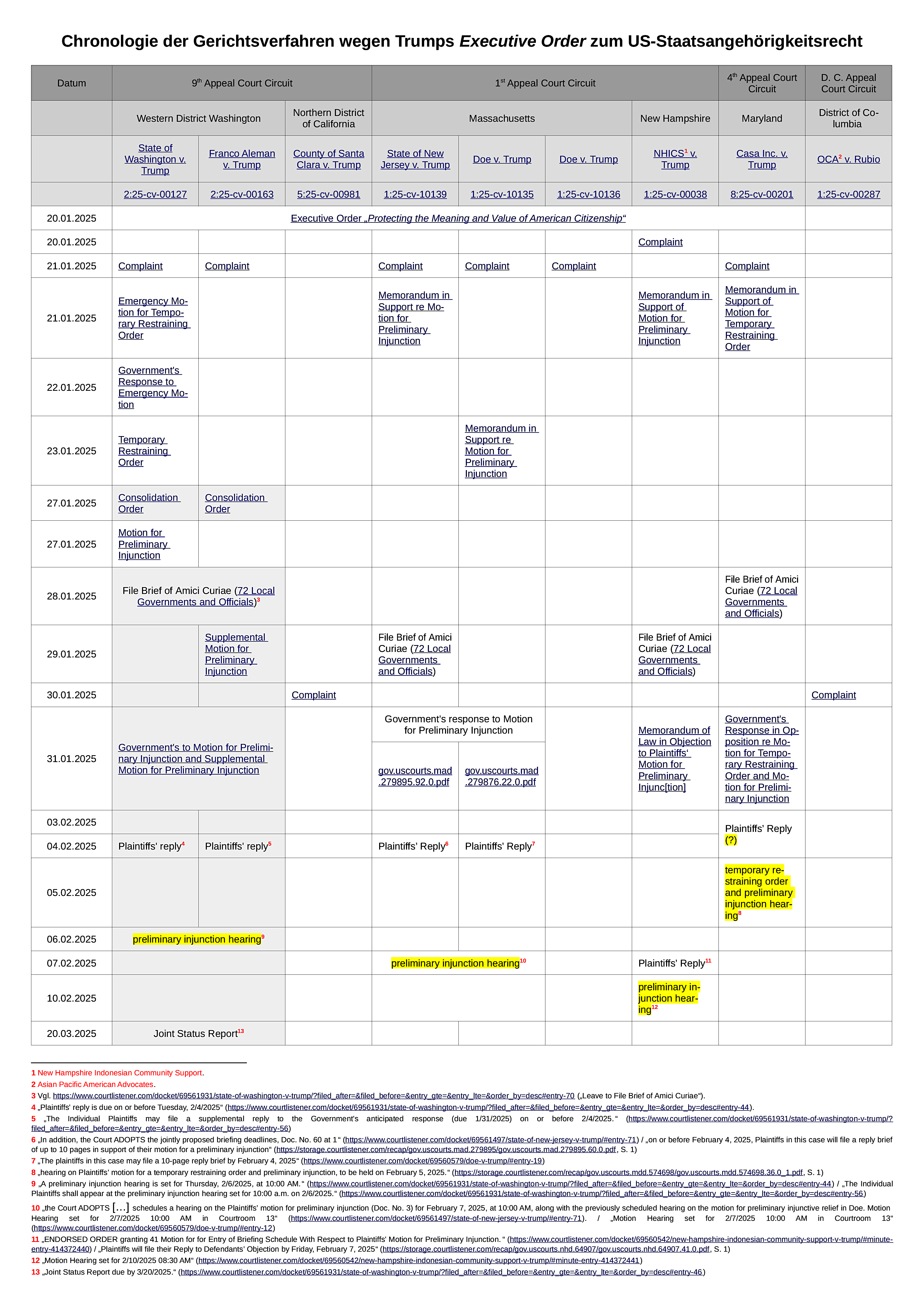
http://blogs.taz.de/theorie-praxis/files/2025/02/Chronologie-US-Staatsangehoerigkeitsrecht.pdf
1 „Wong Kim Ark also identified a fourth category: ‚members of the Indian tribes owing direct allegiance to their several tribes.‘ 169 U.S. at 693. That exception is rooted in the unique relationship that Native Americans had to the national government. 169 U.S. at 681-83 (noting ‚the anomalous case of the Indian tribes‘). Tribes were quasi-sovereign ‚alien nations, distinct political communities‘ within the United States but separate from it, and so a Native American born within the tribe’s territorial authority was, ‚›although in a geographical sense born in the United States,‹‘ not subject to jurisdiction of the United States any more ‚›than the children of subjects of any foreign government born within the domain of that government.‹‘ Id. at 681 (quoting Elk v. Wilkins, 112 U.S. 94, 102 (1884)). Congress subsequently provided for Native American birthright citizenship. Indian Citizenship Act, Pub. L. No. 68-175, 43 Stat. 253 (1924).“ (Fußnote im Plaintiffs-Schriftsatz)
